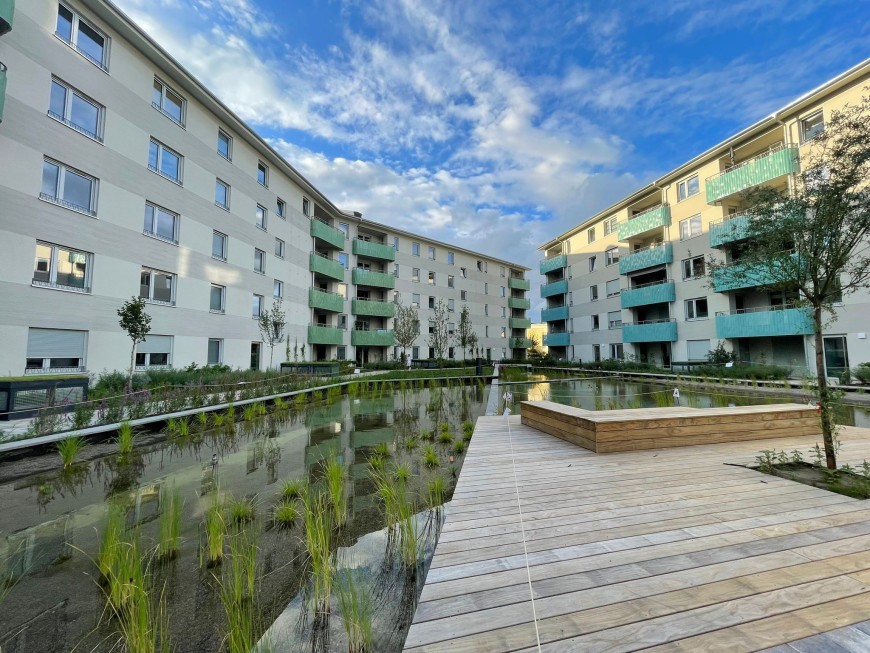How Cities Can Become More Climate-Resilient Through Water Reuse
New Aubuckel Residential Quarter Opens in Mannheim
2025/08/11 by DBU / FB15
The Aubuckel residential quarter in Mannheim-Feudenheim, which opened on August 5, could become a blueprint for all of Germany: showing how cities and municipalities need to be redesigned to cope with the impacts of the climate crisis—and to conserve valuable water through reuse. Drought, heat, groundwater stress, as well as heavy rainfall and flooding as consequences of rising temperatures, are forcing a radical rethinking in urban planning. The goal must be to use more greywater instead of fresh water. The Aubuckel project, “ReSource Mannheim,” was designed by the Department of Design and Urban Development at the Faculty of Architecture and funded by the German Federal Environmental Foundation (DBU).

The Aubuckel residential quarter demonstrates how the use of rainwater and household greywater can be much more efficient than before. The water used in homes—also called service water or greywater—comes from showers, sinks, and washing machines. It is collected, purified in an ultrafiltration system, and then largely returned to households—for example, for toilet flushing, and it is even suitable for reuse in washing machines.
At the heart of the Aubuckel project’s irrigation system is a pond network that, in addition to providing recreational space for residents, serves two main functions: storing excess rainwater for irrigating green areas and cooling during heat waves, and protecting against flooding. The system is designed to handle even large volumes of water during extreme heavy rainfall events. This setup creates an interface between technical water treatment and natural water storage.
Freshwater demand can be reduced by more than 40 percent.
The project was scientifically designed by the Department of Design and Urban Development and implemented in collaboration with GBG – Mannheimer Wohnungsbaugesellschaft – and an interdisciplinary planning team of seven partners. Together, they draw a promising conclusion for water resource management in the new Mannheim residential quarter: freshwater demand can be reduced by more than 40 percent.
Two recent reports underscore the urgency of action: the German Weather Service declared 2024 the warmest year since records began, with heatwaves, heavy rainfall, and urban flooding. Sealed surfaces and dried-out soils prevent rainwater from infiltrating, disrupting the water balance. Additionally, an ISOE study commissioned by the environmental organization BUND warns of declining groundwater levels: over half of all districts suffer from groundwater stress, threatening soils, ecosystems, and drinking water supplies, which rely on groundwater for nearly 90 percent of their volume. The Mannheim Aubuckel project demonstrates how groundwater consumption can be reduced.
Contact Persons at the Faculty:
Prof. Dr.-Ing. Annette Rudolph-Cleff
Dr.-Ing. Simon Gehrmann
Dipl.-Ing. Frederik Helms
More Information
